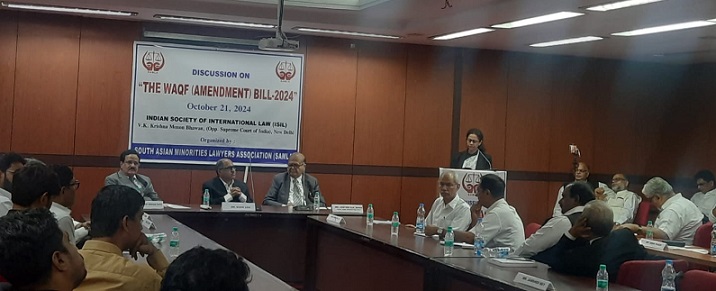Last Updated on October 22, 2024 5:43 pm by INDIAN AWAAZ
SAMLA demands personal hearing with the JPC
AMN / New Delhi
The South Asian Minorities Lawyers Association (SAMLA), a pan-Indian organization of practicing lawyers from the Supreme Court, High Courts, and District Courts, fiercely demanded on Monday an audience with the Joint Parliamentary Committee on Waqf. The organization described the Waqf (Amendment) Bill, 2024 as detrimental to the Waqf cause and a direct intrusion into one’s religious affairs.

At the roundtable conference on the proposed Waqf Amendment Bill at the Indian Society of International Law (ISIL), V.K. Krishna Menon Bhawan, here, the organization passed over half a dozen resolutions after following extensive discussions on the contentious Waqf bill.
In his opening remarks, Adv. Nasir Aziz, President of SAMLA, stated that the organization delivered a detailed memorandum to the JPC and all of its members regarding the contentious law, which included suggestions and concerns. “However, regrettably, we did not receive a receipt. We had a conversation with Ms. B. Joshi, the undersecretary, who said that it ought to be regarded as submitted and that she would fetch it, “ Aziz added.
The president of SAMLA also disclosed that we had repeatedly made request to the JPC for an in-person hearing, but we haven’t heard back from them yet.
We said that as a group of advocates, we have some legitimate legal concerns to bring before the JPC, but the JPC isn’t responding to us, he said.
In his keynote address, Syed Shahid Rizvi, an advocate of the Supreme Court of India, outlined the harmful provisions of the proposed waqf bill. He stressed the legislative history of “Waqf” in India while tracing the theological roots of the term back to the Holy Quran and Sahih Hadeeths, drawing attention to the possible legal ramifications for Waqf institutions in the whole country. The three fundamental characteristics of Waqf—perpetuity, irrevocability, and inalienability—were emphasized by Rizvi, who also noted that these ideas are backed by a strong body of law and multiple rulings from the Supreme Court.
Advocate, Supreme Court of India, Syed Shahid Rizvi explained deleterious clauses of the proposed waqf bill. Drawing attention towards its potential legal implications for Waqf institutions in the country, he traced the theological roots of “Waqf” to the Holy Quran and Sahih Hadeeths while also emphasizing its legislative history in India. Rizvi underscored the core attributes of Waqf—perpetuity, irrevocability, and inalienability—pointing out that these principles are supported by a robust legal foundation and reinforced by numerous Supreme Court judgments.
Among the main issues and concerns brought up by the participants during the roundtable discussion were the following:
(i) The Bill’s alter the fundamental essence and character of the Waqf. The Bill’s proposal to amend the definition of Waqf would do away with “Waqf by user” (Section 3(r)), introduce inheritance laws (Section 3A(2)), ban non-Muslims from making donations to Waqf (Section 20), and limit the creation of Waqf for practicing Muslims for a period of five years (Section 3(r)). These modifications have the potential to seriously damage the Waqf’s current structure, directly meddling in Muslims’ religious matters and possibly breaching Articles 14, 25, 26, and 30 of the Indian Constitution.
They also emphasized how the Bill alters the character and makeup of CWC, WB, and its leaders. In contrast to established practices seen in other religious communities, such as Hindu temples, Sikh gurudwaras, Jain temples, and Buddhist monasteries, where legal affairs are managed exclusively by members of the respective faiths to maintain the integrity of the institutions, the proposed Bill introduces significant changes to the composition and management of the Central Waqf Council (CWC) and Waqf Boards (WB).
Presiding over the event, former judge of Allahabad High Court Justice Z U Khan said it is a matter of concern that legimate stakeholders like SAMLA was invited by the JPC. Referring to the Sunheri masjid case, he said there are several unscrupulous elements in the community who are causing immense damage to waqf institutions.
Following the discussion, the conference passed several resolutions forcefully demanding a personal hearing with the JPC.
One of the resolutions states that:
“We are convinced that the proposed Bill, if allowed to be passed, would seriously impair the rights and interests of the Muslim Community. Therefore, we have unanimously resolved and decided to take, inter-alia, following steps to safeguard rights and interests of Muslim minority in India—– including i: follow up with the JPC for a personal hearing,
i. holding meetings, conferences and discussions amongst legal and general community informing them of the legal consequences of the Bill,
ii. Meeting with like minded members of Parliament requesting to protect Waqf interest,
iii. Last, but not the least to take steps as available under law..”
Besides Aziz and Rizvi , Jalisul Hasan Jafri, SM Arif, Jamshed Bey, ZK Faizan, Mansoor Ali and others put-forth their views on the proposed bill.
